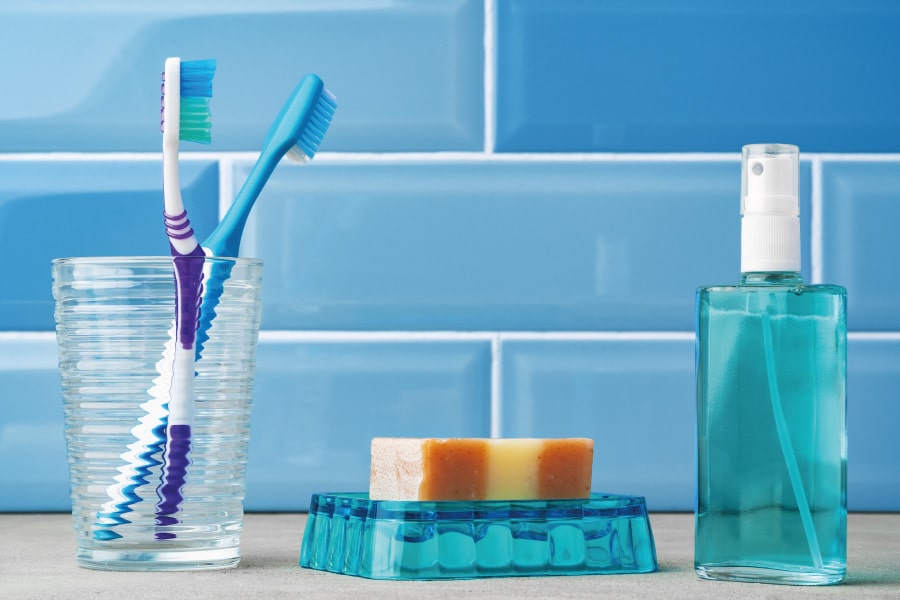Oral Hygiene at Home: 5 Tips for Healthy Teeth
Good oral hygiene is the key to healthy teeth and a bright smile. However, regular brushing alone is not always enough. Only by using the right technique and additional tools can you effectively prevent cavities and gum disease.
So, what does the best at-home dental care routine look like? In this article, we share 5 proven tips to keep your teeth and gums healthy in the long run. At Zahnarzt am Markt in Wiesbaden, we provide personalized advice for your oral hygiene.
1. Tip: Use the Correct Brushing Technique
Many people brush their teeth incorrectly – too quickly, with too much pressure, or using the wrong technique. This can damage enamel and increase the risk of gum inflammation.
How to Brush Your Teeth Properly:
- Use a soft or medium-bristle toothbrush to protect your gums.
- Brush for at least two minutes, twice a day.
- Hold the toothbrush at a 45-degree angle to the gum line.
- Use circular and sweeping motions instead of scrubbing.
Manual or Electric Toothbrush?
Studies show that electric toothbrushes remove more plaque than manual ones. Sonic toothbrushes are particularly effective and gentle on gums.
2. Tip: Use Dental Floss and Interdental Brushes
Toothbrushes clean only about 60% of tooth surfaces. Food particles and plaque often remain in interdental spaces, where brushing cannot reach. This is where dental floss or an interdental brush comes in.
Which Method Is Best?
- Dental floss: Best for tight spaces between teeth.
- Interdental brushes: Recommended for wider gaps or braces wearers.
Cleaning between teeth daily significantly reduces the risk of cavities and gum disease.
3. Tip: Choose the Right Toothpaste and Mouthwash
Not all toothpaste is suitable for everyone. While some contain fluoride to prevent cavities, others are formulated for sensitive teeth or gum problems.
Which Toothpaste Should You Use?
- Fluoride toothpaste: Strengthens enamel and protects against cavities.
- Toothpaste for sensitive teeth: Contains soothing ingredients like potassium nitrate.
- Whitening toothpaste: Removes stains but should not be used daily.
Are Mouthwashes Necessary?
Mouthwashes can be a useful addition but do not replace brushing. Chlorhexidine-based rinses help with gum inflammation but should not be used long-term.
4. Tip: Reduce Sugar Intake and Maintain a Tooth-Friendly Diet
Our diet significantly impacts oral health. Sugary foods promote cavities, while some foods strengthen enamel.
Foods That Are Good for Your Teeth:
- Dairy products: Contain calcium, which strengthens enamel.
- Raw vegetables: Stimulate saliva production and mechanically clean teeth.
- Nuts: Rich in minerals essential for strong teeth.
What to Avoid?
- Sugary drinks: Soft drinks and fruit juices contain high amounts of sugar.
- Acidic foods: Lemons, vinegar, and wine can erode enamel.
5. Tip: Get Regular Professional Teeth Cleanings
Even with excellent home care, plaque builds up in hard-to-reach areas. Professional teeth cleaning (PZR) removes tartar and stains, ensuring complete oral hygiene.
How Often Should You Get a Professional Cleaning?
- 1–2 times a year: Sufficient for most people.
- Every 3–6 months: Recommended for those with gum disease or high cavity risk.
At Zahnarzt am Markt in Wiesbaden, we offer gentle and thorough professional cleanings for optimal oral health.
6. Conclusion
Good oral hygiene starts at home. With the right brushing technique, flossing, a healthy diet, and regular dental visits, you can maintain your teeth for years to come.
At Zahnarzt am Markt in Wiesbaden, we provide individual recommendations and professional cleanings to keep your smile healthy.
Book Your Appointment Now!
Want to learn more about the best oral hygiene practices? Schedule a free consultation at our clinic! Use our online booking form.

 RU
RU DE
DE EN
EN
